We always come across Point of Sale(POS) systems in our daily lives, but most of us aren’t that interested in them as consumers. However, a POS system is essential if you ever decide to start your own small business, especially a physical store.
You might not know where to get one right away, and even if someone tries to sell you one, you might not be sure if it’s good or not. So, today I’m here to recommend 6 POS systems for small businesses. I’m sure there’s one that’ll be perfect for you.
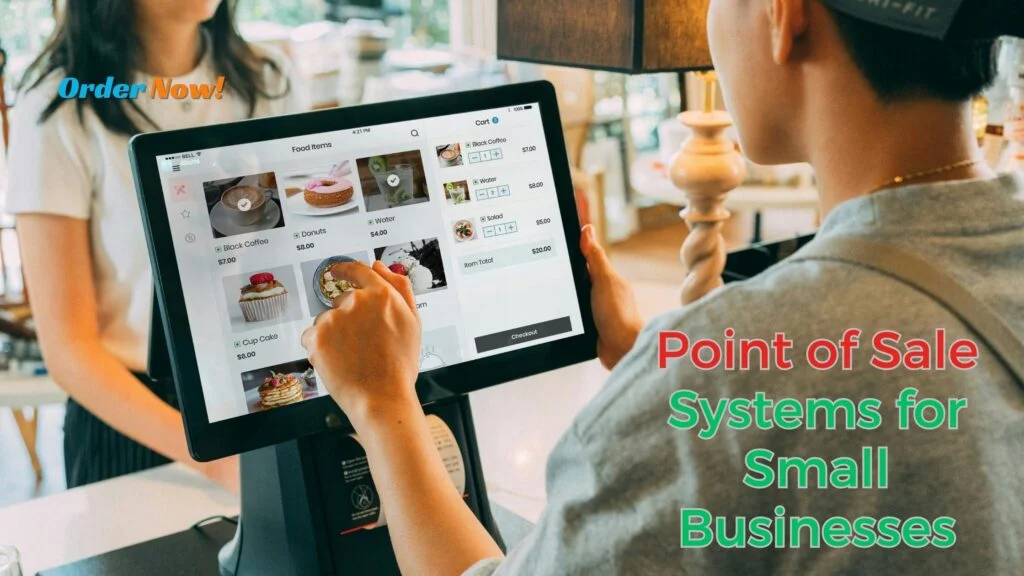
What is Point of Sale(POS) System
POS stands for Point of Sale, and it’s got a couple of meanings. Most people are familiar with it referring to the physical location where a customer finalizes a purchase. For instance, in a retail store, this would be the checkout counter. Back in the day, that usually meant a cash register.
While a POS system, or point-of-sale system, is an electronic system that businesses use to manage and process sales transactions. It typically consists of a combination of hardware and software, including a computer, a monitor, a barcode scanner, a receipt printer, and a payment terminal.
POS systems are essential for businesses of all sizes, from small retail shops to large enterprises. They streamline the checkout process, track inventory, and provide valuable data about sales and customer behavior.
Modern POS systems offer a wide range of features beyond basic transaction processing. These features can help businesses improve efficiency, increase profitability, and enhance customer service. Some common POS system features include:
- Inventory management: POS systems can track inventory levels in real-time, so businesses always know what they have in stock. This helps to prevent stockouts and overstocking.
- Customer relationship management (CRM): POS systems can collect customer data, such as names, addresses, and purchase history. This data can then be used to create targeted marketing campaigns and improve customer service.
- Sales analytics: POS systems can generate detailed reports on sales data. This information can be used to identify trends, track performance, and make informed business decisions.
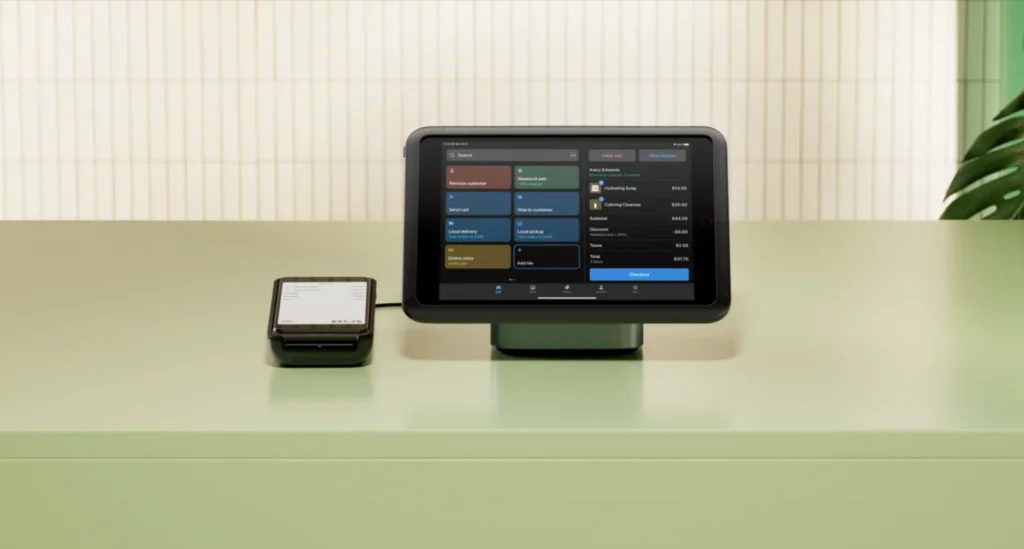
In addition to these core features, many POS systems also offer a variety of advanced features, such as Online ordering, Employee management, Loyalty programs, etc.
The cost of a POS system can vary depending on the size and features of the system. However, there are many POS systems available on the market that can cater to businesses with varying budgets, so let’s delve into some of these systems. It’s important to note that this discussion will primarily focus on Point of sale software, as hardware components may need to be purchased separately.
1. Shopify POS – Online and offline sales seamlessly
Shopify is a well-known online e-commerce platform and SaaS software that many businesses use to build their own online stores. Shopify has enabled numerous merchants to create e-commerce websites, some of which even sell products globally. On Shopify’s e-commerce platform, they’ve developed a POS system that works alongside their online store system. Therefore, Shopify’s POS system is renowned for its seamless integration of online and offline sales channels.
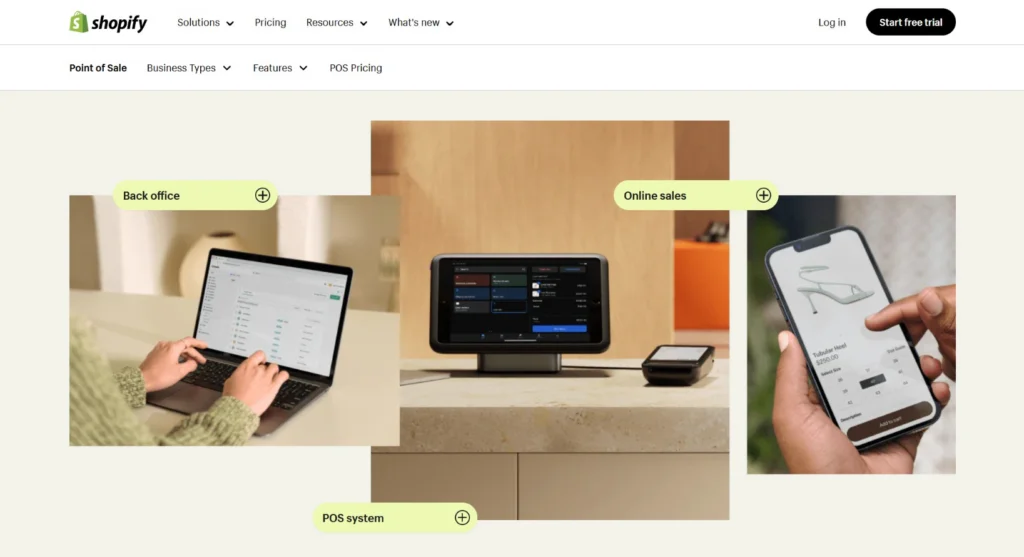
Key Features of Shopify POS:
Shopify POS Pricing Plans:
To understand the pricing of Shopify POS, you need to know the difference between Shopify plans and Shopify POS plans, let’s start by getting a general understanding of Shopify’s plans:
Shopify POS Plans & Pricing:
SELL IN person| Plans | Starter(POS Lite) | Retail(POS Pro) |
| Price | US$5/month | US$89/month/location |
| Card rates start at | 5% + 30¢ USD online 5% + 0¢ USD in person 5% 3rd-party payment providers* | 2.9% + 30¢ USD online 2.6% + 10¢ USD in person 2% 3rd-party payment providers |
| Standout features | 1 POS login Limited staff can access POS Simple customer profiles Returns at original purchase location | Unlimited POS logins Unlimited staff can access POS Staff roles and permissions Rich customer profiles Customer loyalty insights Returns and exchanges at any location Inventory management Professional retail reports Omnichannel selling |
| For selling on Social online | Besides, For selling at retail stores |
Shopify POS includes two main plans: Lite and Retail.
- Lite Plan: This plan includes only basic transaction features and supports a single physical location for checkout. It’s ideal for merchants who don’t have an online or offline store but need a payment solution. For example, if you sell products on social platforms but lack a payment channel, the Lite plan is perfect for you.
- Retail Plan: This is a full-featured POS system suitable for users with actual physical stores. It includes one POS Pro location for checkout. If you subscribe to a Shopify POS plan only, it is not linked to a Shopify online store and is used primarily for offline transactions, such as those in retail stores and restaurants. It can also handle some online transactions, like sales through social platforms.
*3rd-party payment providers mean that customers don’t use Shopify Payments when making their payments.
Shopify Plans & Pricing:
these plans are for the Shopify online store buildingSELL everywhere| Plans | Basic | Shopify | Advanced | |
| Price | US$39/mo | US$105/mo | US$399/mo | |
| Card rates | 2.9% + 30¢ USD online 2.6% + 10¢ USD in person 2% 3rd-party payment providers | 2.9% + 30¢ USD online 2.6% + 10¢ USD in person 2% 3rd-party payment providers | 2.5% + 30¢ USD online 2.4% + 10¢ USD in person 0.6% 3rd-party payment providers | |
| Standout features | Unlimited POS logins Full-featured online store | 5 additional staff accounts Unlimited POS logins Full-featured online store | 15 additional staff accounts Unlimited POS logins Full-featured online store |
Shopify offers specific plans for building online stores. All Shopify Plans include the Shopify POS Lite plan. If you need to integrate your online and offline stores, you’ll need to subscribe to a Retail(POS Pro) Plan additionally. This ensures that all your transactions, whether online, offline, mobile, or even international, are synced and recorded in a single system.
For businesses that require both online and offline capabilities, combining Shopify Plans with Shopify POS is the perfect solution. For example, the basic Shopify package costs $39 per month, and adding the POS Pro subscription costs an additional $89 per month, this is not very costly for starting a business.
Who is Shopify POS for:
- Online and offline retail stores, Shopify POS allows you to manage in-person sales, track inventory, and offer omnichannel fulfillment options. This system is versatile and can also be used in supermarkets. If you purchase multiple Shopify POS Pro plans, it can be implemented across chain supermarkets.
- If you already have an online store on Shopify, the Shopify POS system will sync your online and offline inventory in real-time, ensuring a seamless and integrated sales experience across all your sales channels.
- Pop-Up Shops & Events: Easily set up temporary sales points and manage transactions on the go.
- Restaurants & Cafes: Process orders efficiently, manage tables, and offer self-service options.
2. Square POS system
In the realm of payment processing, Square stands as a prominent name, offering a comprehensive suite of solutions that empower businesses to accept payments seamlessly and efficiently. At the heart of Square’s ecosystem lies its robust POS system, enabling businesses of all sizes to streamline their checkout processes and enhance customer experiences.
Key Features of Square POS:
Square POS Pricing Plan:
| Plans | Free | Plus |
| Price | US$0/month | US$89/month/location |
| Processing rates per transaction: | ||
| In Person | 2.6% + 10 cents | 2.5% + 10 cents |
| Manual Entered | 2.9% + 30 cents | Unlimited POS logins 2.9% + 30 cents |
| Invoices | 3.3% + 30 cents | 3.3% + 30 cents |
| AfterPay | 6% + 30 cents | 6% + 30 cents |
Square POS also offers two main plans, similar to Shopify POS. For instance, the Free plan corresponds to Shopify’s Lite plan, while the Plus plan matches Shopify’s Retail plan. Both systems are comparable but have their unique features.
Shopify excels in integrating online store building with its POS system, providing seamless synchronization for online, offline, and even international sales. This gives Shopify a significant advantage in this area. While Square also offers a website builder and online store services, it doesn’t stand out as much in this aspect. Instead, Square focuses more on its POS retail services, where its functionalities are more robust.
Hence, Shopify POS is better suited for users with both online and offline businesses due to its strong online store integration. On the other hand, Square POS is ideal for various retail services and excels in this area, though it is slightly less capable for online services.
3. Lightspeed/Vend POS
Lightspeed is more than just a payment platform; it’s a comprehensive retail management solution that encompasses point-of-sale (POS) systems, inventory management, customer relationship management (CRM), and omnichannel capabilities.
Here we will mainly introduce the Lightspeed POS system, Lightspeed is the unified point of sale and payments platform powering the world’s best businesses at ~168,000 locations worldwide.
Many people might have heard of Vend POS before, but it has now become Lightspeed Retail. is a powerful POS system that offers a comprehensive set of features to help retail businesses of all sizes streamline their operations, improve customer experiences, and drive sales growth.
Key Features of Lightspeed POS:
Lightspeed POS Plans:
Lightspeed POS primarily offers two systems: one for retail and another for restaurants. You can choose the one that best suits your industry.
Lightspeed Retail(Vend POS)
| Plans | Basic for new retailers | Core for retailers growth | Plus advanced customization |
| Price | 89USD/mo | 149USD/mo | 239USD/mo |
| Processing rates per transaction: | |||
| In Person | 2.6% + $0.10 | 2.6% + $0.10 | 2.6% + $0.10 |
| Online | 2.9% + $0.30 | 2.9% + $0.30 | 2.9% + $0.30 |
Lightspeed Restaurant
| Plans | Starter | Essential | Premium |
| Price | 69USD/mo | 189USD/mo | 399USD/mo |
| Processing rates per transaction: | |||
| In Person | 2.6% + $0.10 | 2.6% + $0.10 | Custom rates available |
| Online | 2.9% + $0.30 | 2.9% + $0.30 | 2.9% + $0.30 |
The Lightspeed Retail Basic plan should be very suitable for small businesses. It’s comparable to Shopify and Square POS. However, Lightspeed’s system feels more extensive and is targeted more toward large companies and large chain restaurants or supermarkets.
While Lightspeed does cater to small businesses, it does not offer low-cost or free plans, which might deter some small business owners. Nonetheless, given their capability to serve large companies, Lightspeed’s potential is certainly noteworthy. If you’re unsure, you could start with Shopify POS or Square POS first.
4.8
Pros
Cons
Sale: ✨ Get a Demo →
4. Clover POS
Clover is a U.S.-based company that offers point-of-sale (POS) systems. It is part of Fiserv, a global provider of financial services technology.
Clover POS is a versatile and user-friendly point-of-sale system designed to cater to the needs of various types of businesses, from retail stores and restaurants to service-based industries. Clover POS offers a range of hardware and software solutions to streamline operations, manage transactions, and enhance customer experiences.
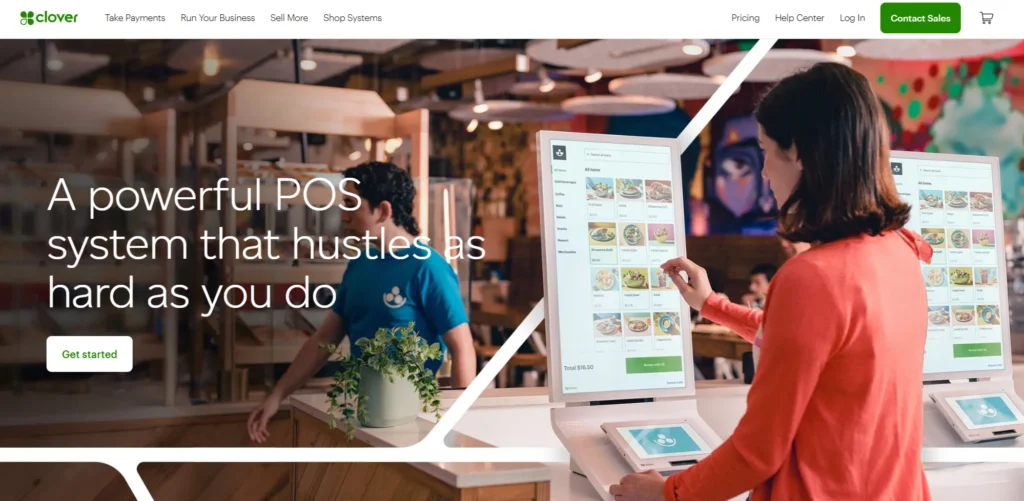
Clover POS can be used in various countries, but their availability and the extent of their services can vary based on regional partnerships and regulatory compliance.
Key Features of Clover POS:
Clover POS Pricing Plans for Businesses:
Clover POS is similar to Lightspeed in that users can choose pricing plans based on their industry. For small businesses, Clover POS’s retail plans are very suitable.
| Plans | Starter | Standard | Advanced |
| Price | $60/mo for 36 months or $799+ $14.95/mo | $135/mo for 36 months or $1,799+ $49.95/mo | $190/mo for 36 months or $2,398+ $69.90/mo |
| Processing rates per transaction: | |||
| Card tapped, swiped, or inserted | 2.6% + $0.10 | 2.3% + 10¢ | 2.3% + 10¢ |
| Card information typed in | 3.5% + 10¢ | 3.5% + 10¢ | 3.5% + 10¢ |
| Hardware Device Included: | |||
| Mini 8″ touchscreen POS with built‑in receipt printer | |||
| Station Duo – 14″ merchant-facing POS with 8″ customer screen | |||
| Flex – Handheld POS with an 8-hour battery life and built-in receipt printer | |||
| Receipt printer | Built-in |
Clover POS can be a bit pricey for many small and medium-sized businesses to start with, but their pricing includes some hardware. Depending on the plan, different hardware equipment is provided.
However, Clover POS offers rich features and a customizable interface, which can meet the needs of many users. While the initial cost is relatively high, the starter price isn’t too expensive for a long-term business. After all, other POS systems also require additional hardware purchases, so the average monthly cost is roughly the same.
4.7![]()
Pros
Cons
Sale: ✨ Get Started with Clover POS →
5. Toast POS – food service industry
Toast POS is a cloud-based POS system specifically designed for the food and beverage industry. At first glance, it might seem out of place in a list of POS systems for small businesses, but it’s incredibly well-known. Plus, many restaurant owners are small business owners too. If you’re not in the restaurant business, you can just skip over this one.
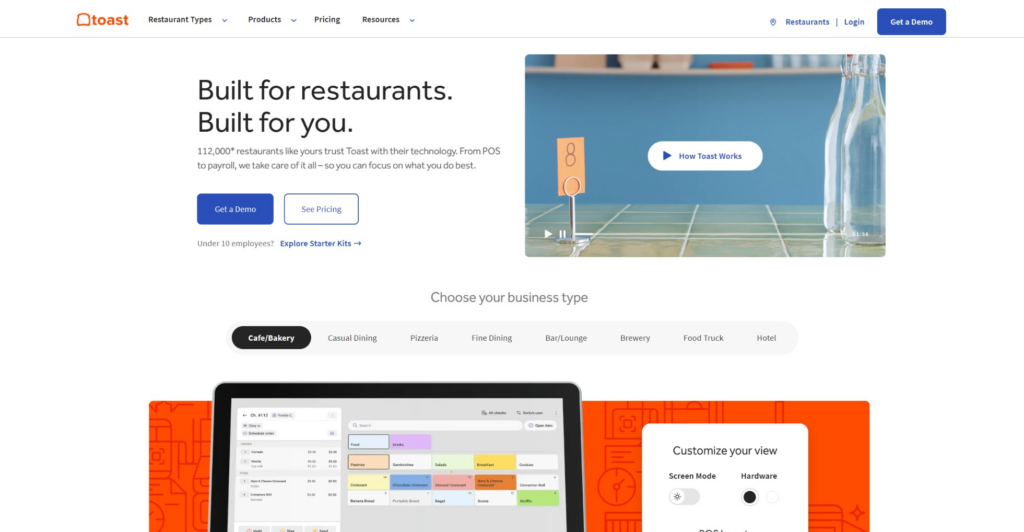
Key Features of Toast POS:
Toast POS Pricing Plans for Businesses:
| Plans | Starter Kit | Point of Sale | Build Your Own |
| Price | $0/mo | $69/mo | Custom Pricing |
| Processing rates per transaction | 2.49% + $0.15 | 2.49% + $0.15 | 2.49% + $0.15 |
| Configuration | 1 location, up to 2 terminals | Custom | Custom |
Toast POS also offers a free version for many small restaurants to get started, and their transaction fees are very low. The upgrade costs are competitive with industry standards, and most importantly, Toast supports users in customizing the features they need.
4.7![]()
Pros
Cons
Sale: ✨ Get Demo →
6. Shopline POS – Best for Southeast Asia
Shopline is a Hong Kong-based company founded in 2013. It aims to help businesses quickly set up and manage their online stores. Their business model is very similar to Shopify. In addition to their online store building platform, they have also launched their own Shopline POS.
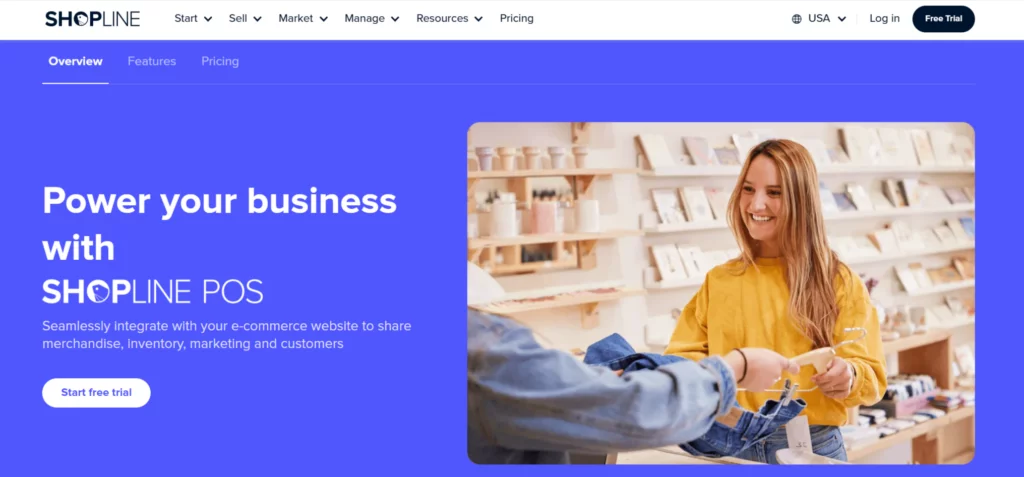
Shopline holds a significant market share in Southeast Asia, particularly in Mainland China, Taiwan, Hong Kong, Malaysia, and Vietnam. In recent years, Shopline has also expanded into larger international markets, performing quite well in North America.
Key Features of Shopline POS:
Shopline POS Pricing Plans for Businesses:
| Plans | POS Lite | POS Pro |
| Price | $39/mo | $79/mo |
| In-person Credit Card Rates | 2.6% + $0.30 | 2.6% + $0.30 |
| PayNow Fees: | 0.7% | 0.7% |
As mentioned earlier, Shopline operates in a business model very similar to Shopify’s. They offer separate POS plans and integrate POS into their online store building system. Shopline POS mainly consists of two plans: Lite and Pro. However, their Lite plan starts at a minimum of $39/month, and it’s not included in their website building system. On the other hand, Shopline’s Pro plan is slightly cheaper than Shopify’s, priced at $79/month.
Shopline POS also offers annual subscription plans, which come at a more favorable price.
4.7![]()
Pros
Cons
Sale: ✨ Try Shopline POS free for 14 days →
Conclusion
There are indeed many POS systems available on the market, but the ones listed here are among the top providers. You will likely see these POS systems mentioned in any POS recommendation article.
With the advancement of technology and the internet, especially mobile technology, POS systems are increasingly leaning towards online functionality. Fortunately, the recommended POS systems above all support online payments, which could be an important consideration for future businesses.
Finally, I highly recommend Shopify POS and Square POS. They are more suitable for small businesses and startups, offering excellent pricing and service. Shopify, in particular, can be paired with their online website builder, making it accessible to users worldwide.







